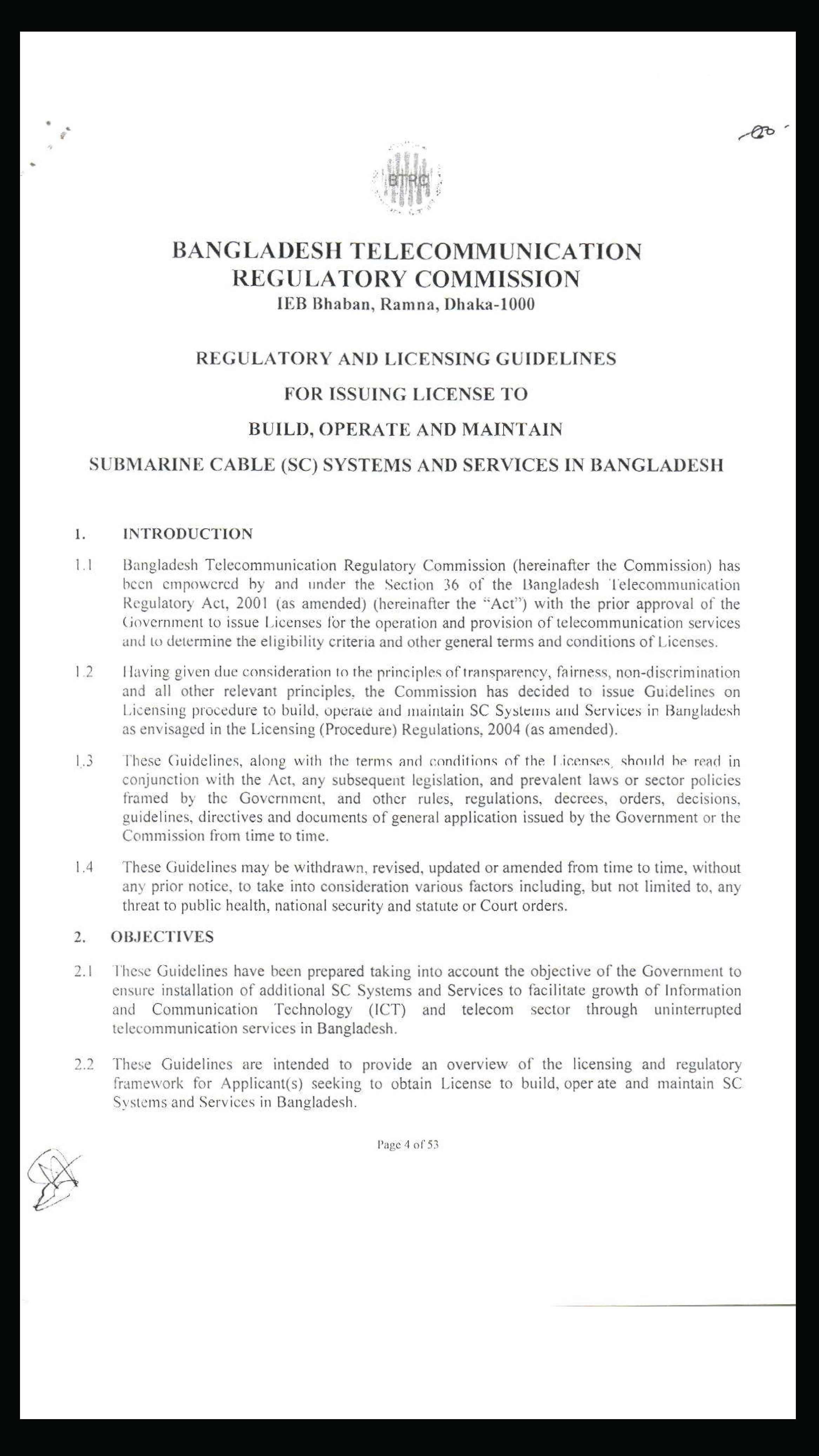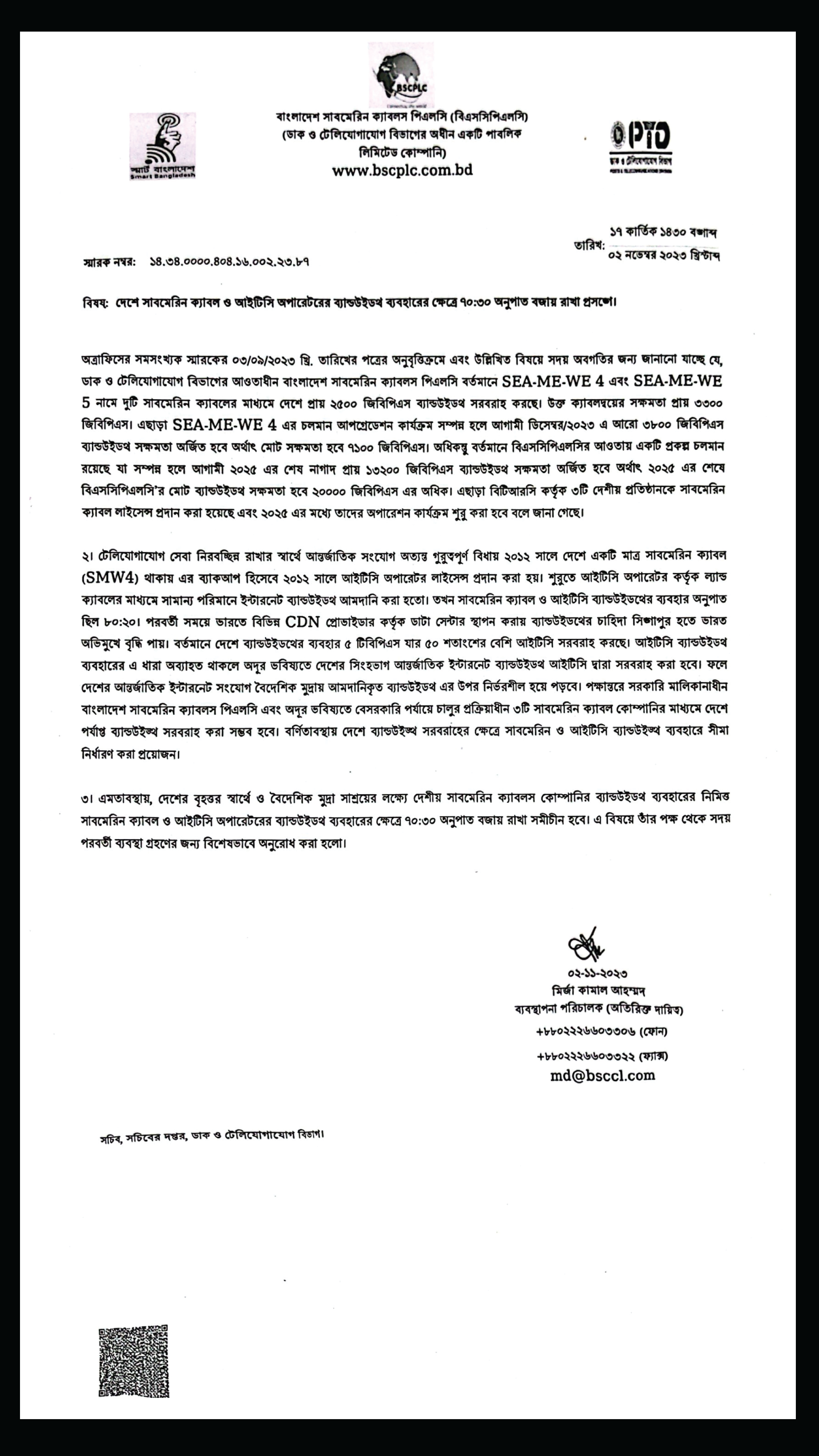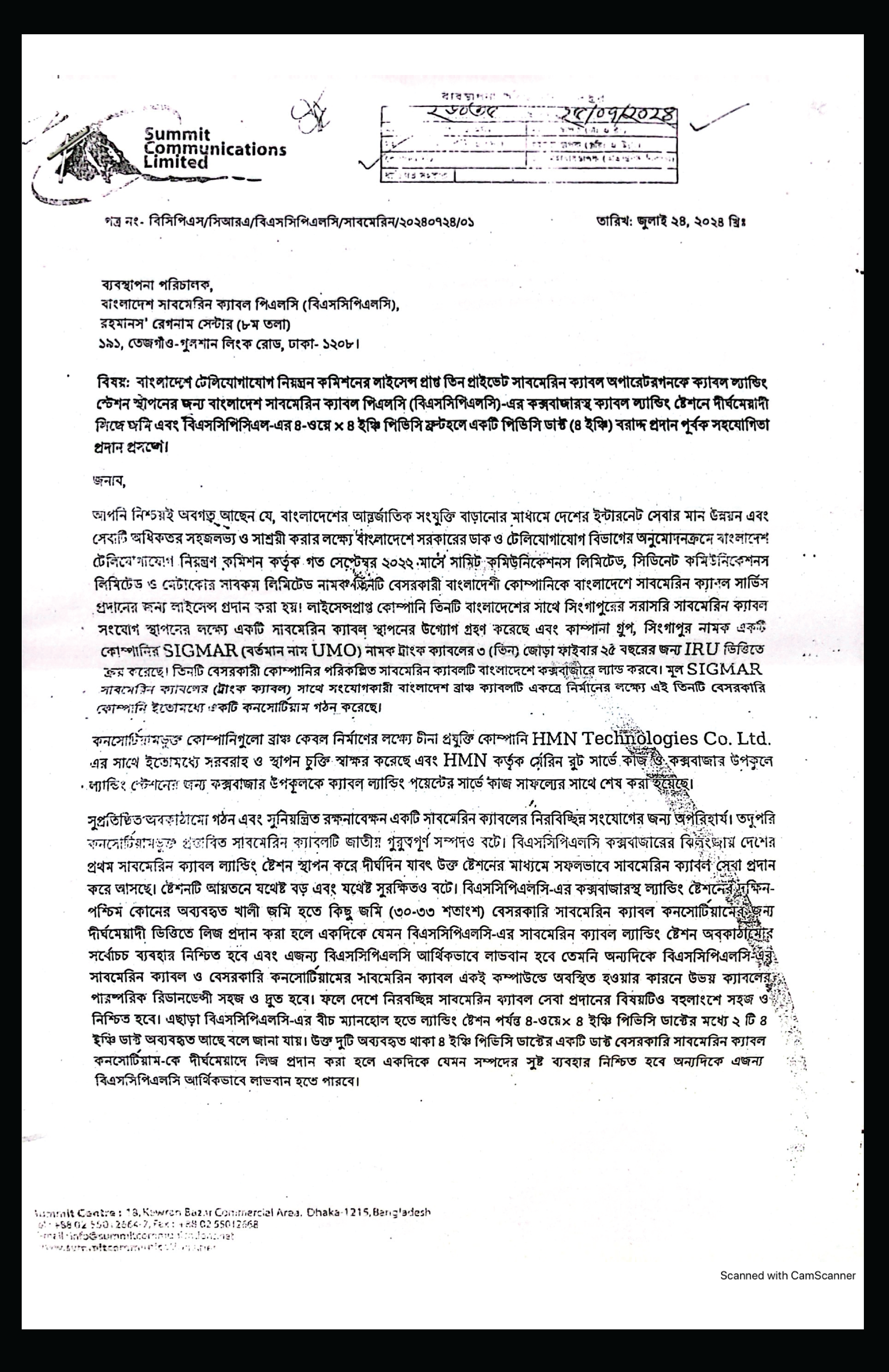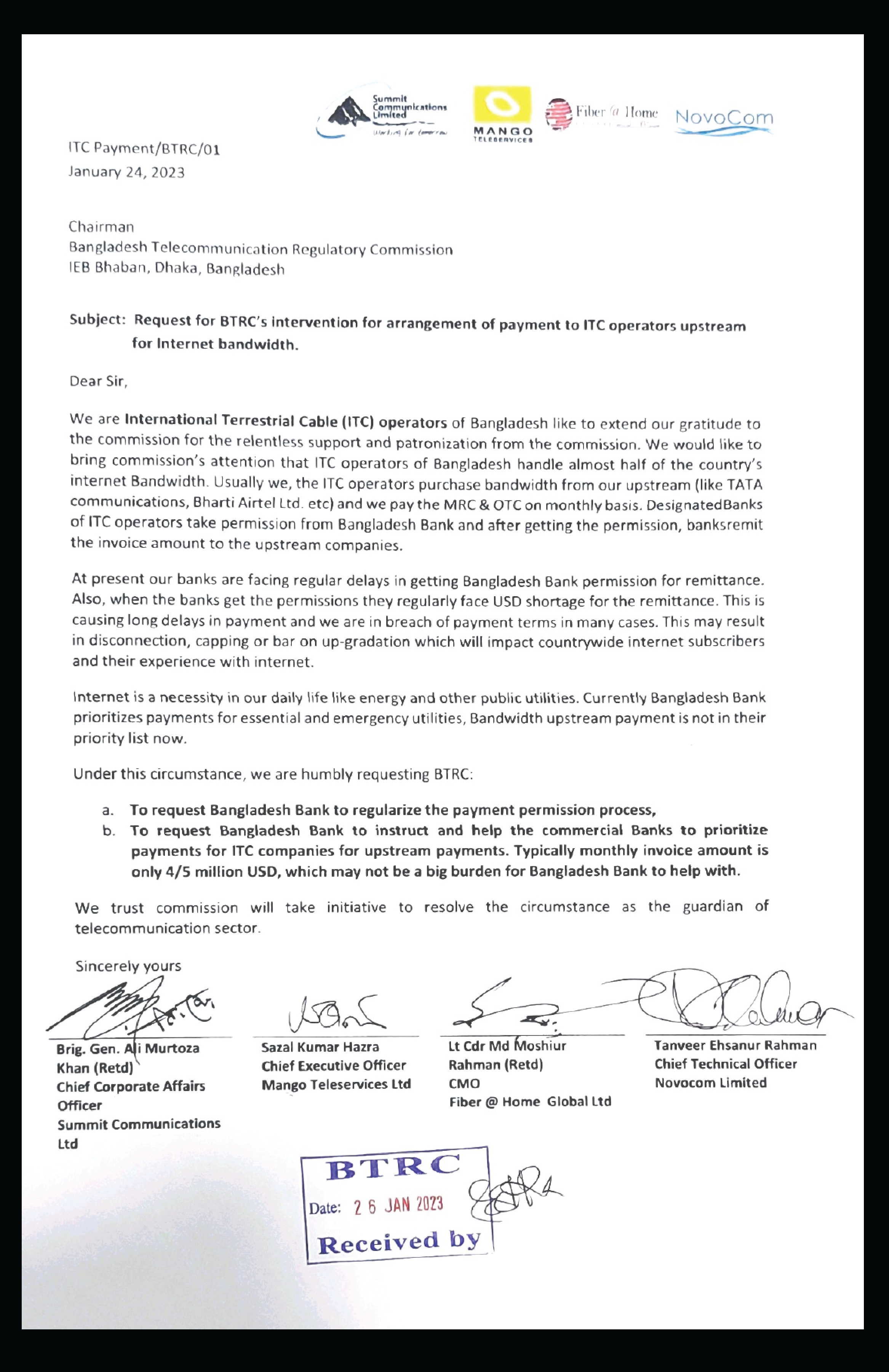How Bangladesh’s internet held captive by Summit Group
-6701130c2f5d7.png)
Aside from the S Alam Group, another notable entity that has experienced a meteoric rise in wealth and influence during Sheikh Hasina's 15 years in power is the Summit Group.
Like its logo, the group has swiftly ascended to the top without lingering at the base or undergoing the necessary legal acclimatization that typically precedes such rapid success.
Aziz Khan, the chairman of the group, was recognized as a billionaire in Singapore in 2022, with prominent publications like Forbes and the Financial Times highlighting his impeccable fashion sense and passion for art collections.
In Bangladesh, whispers circulate about how Khan managed to accumulate such immense wealth and transfer it to Singapore.
While his dominance in the power sector—where his group generates the majority of private electricity in the country, thanks to Sheikh Hasina—contributes significantly to his fortune, another often-overlooked area is his control over the IT sector, particularly the internet.
The Awami League government effectively facilitated the Summit Group's unilateral dominance in Bangladesh's internet sector.
An investigation by Bangla Outlook revealed that the entire internet landscape, which has expanded significantly over the past decade, is primarily managed by Summit Technology, a subsidiary of the Summit Group.
-670111cb3441b.png) Who provides internet/bandwidth in
Bangladesh?
Who provides internet/bandwidth in
Bangladesh?
To solidify its control over the internet sector and undermine stability, Summit has been consistently favored by the different machineries of the Awami government
This preferential treatment, as confirmed by an anonymous industry expert, reflects politically driven decisions by Sheikh Hasina that disregard established policies.
A clear example of this occurred in 2022 when, despite Bangladesh having sufficient internet bandwidth, Summit and two other private companies were granted submarine cable licenses. This move prioritized political connections over the country's actual needs.
Currently, Bangladesh accesses the global internet through two avenues: submarine cables and International Terrestrial Cables (ITC). The state-owned Bangladesh Submarine Cable Company Ltd (BSCCL) manages the country's bandwidth from submarine cables.
Since 2008, BSCCL has successfully operated the SIM-4 cable landing station in Cox's Bazar and the SIM-5 cable landing station in Kuakata, providing a combined bandwidth capacity of roughly 7,000 Gbps.
It is to be noted that as the sole profitable entity within the Ministry of Posts and Telecommunications, BSCCL is a valuable asset for the government.

An official from BSCCL told Bangla
Outlook that as a backup for the submarine cable, six ITC licenses were issued
in 2012 and one in 2014, allowing a total of seven organizations to import
bandwidth from India to Bangladesh.
This import was initiated solely as an alternative measure to ensure that internet services would not be disrupted in the event of damage to the submarine cable.
At that time, only the SIM-4 submarine cable was operational, and the decision to grant ITC licenses was made due to concerns that a single cable could be damaged at any time for various reasons.
Although Bangladesh primarily relies on submarine cables for internet connectivity, a surprising shift has occurred. BSCCL officials revealed to Bangla Outlook that the International Terrestrial Cables (ITC), initially intended as a backup system, now serve as the dominant source of bandwidth.
This change is largely attributed to the rise of private operators who, instead of investing in expensive submarine cable infrastructure, opted for cheaper, albeit lower quality, bandwidth from India via optical fiber connections. This has led to a surge in bandwidth imports from India.
Currently, Bangladesh consumes a total of 6,200 Gbps of bandwidth. While BSCCL provides 2,900 Gbps through submarine cables, the remaining 3,300 Gbps comes from seven ITC operators, with Summit alone contributing 2,500 Gbps.
This means that BSCCL supplies 46% of the country's total demand, while the remaining 54% is provided by ITC, the majority of which is imported through Summit.
-670112069dafe.png) What are the costs involved in
importing via ITC?
What are the costs involved in
importing via ITC?
While ITCs serve a crucial purpose as a backup for internet connectivity, prioritizing them over BSCCL as the primary source raises serious concerns.
Industry experts draw a parallel to relying on expensive, fuel-driven electricity generation by independent power producers (IPPs) – a sector also dominated by Summit.
This shift towards ITC dominance not only potentially increases costs but also raises questions about strategic control over a critical national resource like internet bandwidth.
Documents obtained by Bangla Outlook reveal that importing bandwidth from India costs an alarming $4 to $5 million per month, totaling $50 to $60 million annually.
Meanwhile, BSCCL officials report having 800 Gbps of unused bandwidth capacity. Despite currently supplying 2,900 Gbps, they have the potential to provide up to 3,700 Gbps, meaning 60% of their capacity remains idle.
This raises serious questions about the necessity of importing bandwidth from India, especially when BSCCL has the capacity to meet domestic demand.
While some argue that existing private sector investments in ITC necessitate a gradual reduction rather than a complete shutdown of imports, it seems counterintuitive to allow Summit to capitalize on this situation by straining national reserves when the government already possesses ample bandwidth capacity.

This raises concerns about potential
vested interests and calls for a closer examination of the decision-making
process, sat the industry experts suggesting that a policy should be
implemented quickly whereby any customer can take a maximum of 30% of their
required bandwidth from ITC, while the remaining 70% must be sourced from
submarine cables.
This would ensure the optimal use of government-provided bandwidth and help conserve the country’s reserves, they said.
Since BSCCL is capable of supplying 100% of the country's bandwidth demand, it is in the national interest to gradually reduce the bandwidth usage from ITC from 30% to zero.
A letter (Memo No: 14.34.00.0000.404.16.002.23.87) was sent to the relevant ministry on November 2, 2023, regarding this matter. However, for mysterious reasons, there has been no progress on this issue, as Bangla Outlook found out.
The government is losing revenue due to Summit's manipulations.
Currently, ITC operators meet 54% of Bangladesh's bandwidth needs, with Summit Communications dominating the ITC sector by importing around 80% of this bandwidth.
In contrast, the state-owned BSCCL provides the remaining 46% through submarine cables. However, a significant disparity exists in revenue sharing: BSCCL contributes 3% of its revenue to the government, while ITC operators, including Summit, share only 1%.
This discrepancy means that despite handling a larger share of the market, Summit and other ITC operators contribute proportionally less to government coffers. This results in millions of taka in lost revenue for the government, effectively benefiting a select group.
-670112416213c.png) To illustrate, in the last fiscal year,
BSCCL generated approximately 51.5 billion taka and paid around 1.8 billion
taka to the government, while Summit and other ITC operators, despite higher
business volume, shared a much smaller proportion of their earnings.
To illustrate, in the last fiscal year,
BSCCL generated approximately 51.5 billion taka and paid around 1.8 billion
taka to the government, while Summit and other ITC operators, despite higher
business volume, shared a much smaller proportion of their earnings.
This raises the question: why are private submarine cable licenses being granted when government institutions like BSCCL and the ITC sector already exist?
Stakeholders argue that issuing new licenses for private submarine cables is unnecessary, given BSCCL's capacity to meet current demand and the private sector's existing role in supplying bandwidth through ITC.
Despite having a robust plan in place to meet current and future bandwidth demands, the government's decision to grant private submarine cable licenses in 2022 raises eyebrows.
BSCCL, the state-owned provider, is already capable of fulfilling current needs and is set to significantly expand its capacity with the SIM-6 project.
This project, slated for completion by 2025, will boost BSCCL's bandwidth capacity to over 20,000 Gbps—more than triple the current demand.
Industry stakeholders argue that these facts render private sector licenses unnecessary. Yet, the then-government granted licenses to Summit and two other companies, seemingly prioritizing political considerations over practical needs and existing infrastructure.

An industry engineer, speaking
anonymously, confirmed that the licenses were issued despite BTRC's awareness
of BSCCL's future capacity, suggesting political pressure influenced the
decision. This move not only undermines the substantial investment in BSCCL but
also potentially creates an unfair advantage for private players.
The engineer mentioned that despite objections from former secretary Khalilur Rahman, licenses were granted to the private sector under the directive of Sajeeb Wazed Joy, which was entirely a political decision.
It is also reported that Junaid Ahmed Palak met with the DC of Cox's Bazar regarding providing a location for Summit's landing station to expedite their operations.
Several BSCCL officials have indicated that Sajeeb Wazed Joy’s close association with Summit played a crucial role in the issuance of these licenses.
Examining the ownership of the three licensed companies reveals a clear political motive behind the licensing.
Muhammad Farid Khan, chairman of Summit Communications, is the younger brother of Faruk Khan, a member of the Awami League's presidium and a five-time Member of Parliament for Gopalganj-1. Faruk Khan is a friend of Sajeeb Wazed Joy, the son of former Prime Minister Sheikh Hasina.
The vice-chairman of the licensed Metacor
Subcom company is Rezwan Ahmed Toufiq, a former member of parliament from the
Awami League.
Chowdhury Nafiz Sarafat serves as the
director of Sidinet, and he was involved in various financial scandals in
Bangladesh's banking sector during the tenure of the previous government. The
country's internet infrastructure was handed over to a few groups that were
very close to the former government.
Stakeholders allege that the former managing director of BSCCL, Moshiur Rahman, was involved in the licensing process for the private sector.
The former managing director of BSCCL, Moshiur Rahman, provided all kinds of support, from the application process to the installation of submarine cables, to three private companies. He is considered one of the key figures in launching this business in the private sector.
In 2022, Moshiur Rahman returned to the Directorate of Telecommunications from BSCCL and joined Sidinet as CEO, a company licensed for private submarine cables.
It is reported that while at BSCCL, he also worked as a consultant for Summit. During his tenure, he did not approve the capacity increase for the SIM-4 project, which was later initiated by the next managing director, Habibur Rahman, resulting in an increase of nearly 3,800 Gbps.
Furthermore, allegations have been made that during his more than four-year tenure as managing director, he leaked sensitive information from BSCCL to his current company, as well as to two other private submarine cable operators, Metacor and Summit.

Dispute Over KPI location and duct
lease
On July 24 this year, three private submarine cable companies sought land and PVC duct leases from BSCCL's Cox's Bazar landing station. Concerns have arisen regarding potential information leaks about the PVC duct from within BSCCL.
This lease request was unexpectedly presented at BSCCL's board meeting on July 31 without any prior review.
An anonymous former board director revealed that the current secretary reacted strongly against the proposal, questioning its motives and who stood to gain from its approval.
Adding to the controversy, the Hasina government pushed the BTRC to grant submarine cable licenses to private companies, despite BSCCL having sufficient bandwidth to meet current needs.
This move appears to primarily benefit Summit Communications Limited, granting them a monopoly over key infrastructure like ITC, submarine cables, IIG, and NTBN.
Industry officials lamented that granting Summit licenses at every level of the internet service market is creating a monopoly, destabilizing the sector and hindering competition.
This control allows Summit to manipulate pricing and service quality, potentially exploiting customers and limiting opportunities for new businesses.
Furthermore, this concentration of power in the hands of entities aligned with the previous government raises concerns about potential internet disruptions.
BSCCL officials argue that issuing private licenses is counterproductive, especially since the government has sufficient bandwidth capacity and is investing in another submarine cable project.
They believe this move will lead to revenue loss for the government and harm citizens who own 30 percent of BSCCL shares.
As the only profitable and self-sustaining entity within the Ministry of Post and Telecommunications, BSCCL's success is now threatened. There are fears that granting private licenses could lead to the same financial struggles faced by TeleTalk and BTCL.
—--

